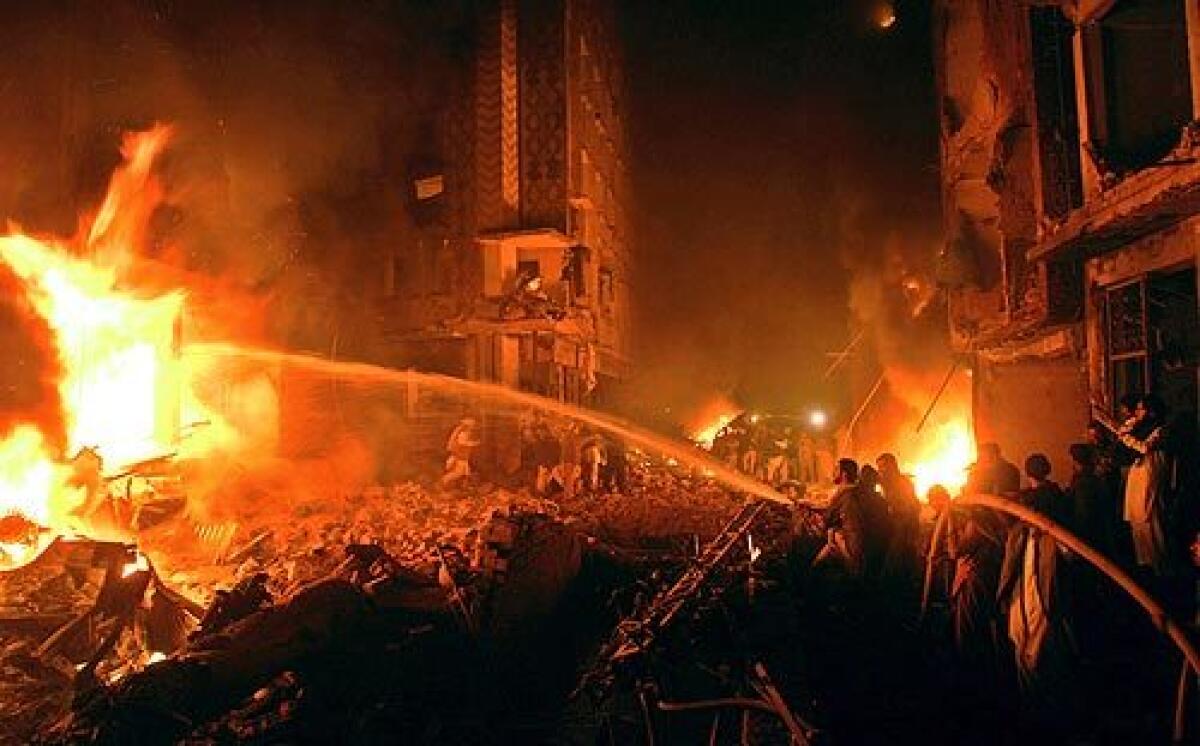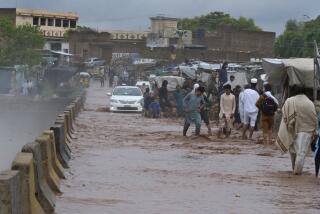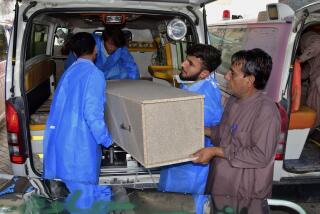Car bomb kills 20 in northwest Pakistan’s Peshawar

A car bomb devastated a busy street in this northwestern Pakistani city on Friday, killing 20 people, injuring scores more and unnerving a region already dangerously on edge following the attacks on India’s commercial capital.
Further adding to the tension, a suspected U.S. missile strike reportedly killed three people in a stronghold of the Taliban and al-Qaida near the border with Afghanistan.
Escalating violence is destabilizing Pakistan’s northwest just as the country faces accusations from archrival India that the gunmen behind the carnage in Mumbai last week were trained in Pakistan and steered by militants based there.
Neither the motive nor the culprits behind the Friday evening blast in Peshawar were clear. But provincial government chief Haider Khan Hoti said “external forces” could be to blame -- a comment understood in Pakistan to mean India.
The bomb went off near Peshawar’s famed Storytellers Bazaar early Friday evening, wrecking a Shiite Muslim mosque and a hotel and setting a string of vehicles and shops ablaze.
Mohammed Bilal, a 28-year-old goldsmith being treated at a city hospital for a gash on his face, said he saw a white van explode in the street as he was walking home.
“Something struck me in face, and I fell down. There was fire and smoke and the cries of the injured people,” Bilal told an Associated Press reporter.
Television footage showed survivors frantically carrying bloodied victims through the rubble to private cars and ambulances as fire crews sought to douse the flames.
Khizer Hayat, a senior doctor at the city’s main hospital, said 20 bodies as well as over 60 wounded people were brought there.
Police chief Malik Naveed Khan said the bomb seemed to contain chemicals designed to spread fire.
While police were guarding government and religious buildings, “it is not possible to prevent this kind of terrorism unless you have extremely credible information,” he said.
Pakistan and the United States have stepped up operations against Taliban and al-Qaida strongholds in the northwest to curb mounting attacks launched from there on targets in Afghanistan and Pakistan.
There have been more than 30 suspected U.S. missile strikes since August, including one on Friday in the North Waziristan region, part of Pakistan’s wild tribal belt viewed as possible hiding place for Osama bin Laden.
Three Pakistani intelligence officials told The Associated Press that one missile hit a house in the village of Khushali Turikhel and another landed in a field.
The officials, who cited reports from agents and informants in the area, said three people were killed and two others injured, however the identity of the victims was not known.
The officials spoke on condition of anonymity because they are not authorized to speak on the record to media.
The missiles are apparently fired from drone aircraft that take off from Afghanistan. U.S. officials rarely confirm or deny responsibility though American leaders have said the attacks have killed several militant leaders this year.
Insurgents have responded with an onslaught of gun and bomb attacks that have sparked concern about the possible disruption of a key supply line for NATO and U.S. troops that cuts through Peshawar and the Khyber Pass into Afghanistan.
Earlier Friday, a suicide car bomber killed six people at a checkpoint in the Orakzai tribal region, just south of Peshawar, after police and local tribesmen waved for him to stop.
In the nearby town of Bannu, police said militants armed with guns and rockets killed two officers manning another checkpoint.
The region is also bedeviled by sectarian tensions between extremists from the majority Sunni Muslim community and minority Shiites. Mosques have been repeatedly targeted in what officials say are tit-for-tat attacks.
The United States is seeking to calm tension between Pakistan and India, nuclear-armed neighbors who have fought three wars, in part to keep Islamabad remains focused on fighting militants in the northwest.
But Hoti, the provincial leader and a member of the party in the federal coalition government, pointed to “elements” in the lawless tribal belt who “act at the behest of external forces” when asked who carried out the attack in Peshawar.
“In today’s tragic incident, the possibility of external involvement is very much there,” he said.
More to Read
Start your day right
Sign up for Essential California for news, features and recommendations from the L.A. Times and beyond in your inbox six days a week.
You may occasionally receive promotional content from the Los Angeles Times.






